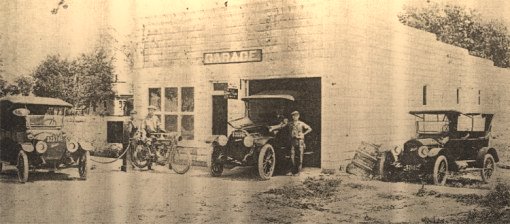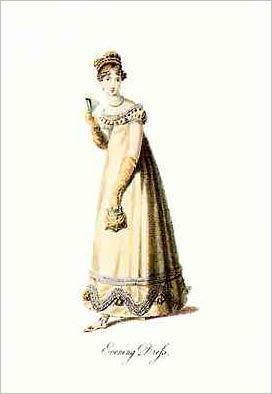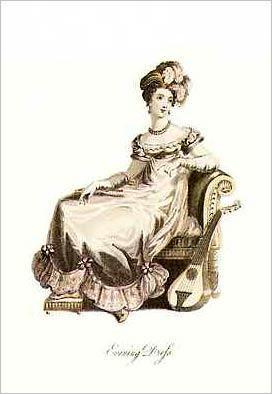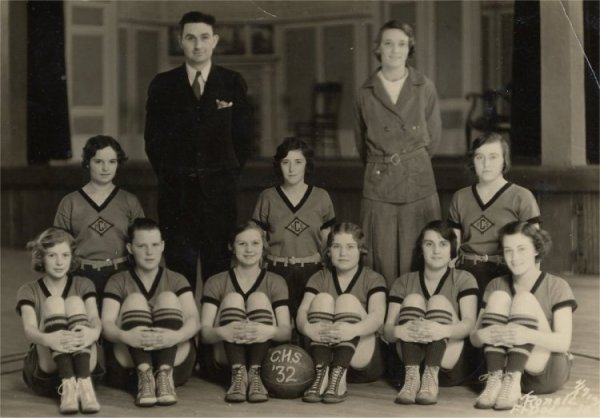![]()
Chapter 5: Town School
When I was in the 5th grade, I started attending town school in Curlew. Both Everett and Russell continued country school through the 8th grade, but dad thought I would receive a better education in town school. This was the year 1925 and right in the thick of the Roaring Twenties. Town school was a lot different than the one-room country school two miles north of town. For one thing country school had grades one through eight in a single room with a single teacher. But in town school I was in a classroom with only three grades; grades four, five, and six. I had nine classmates in those three grades. My teacher was also a close friend of my sisters, Pauline and Helen. Her name was Miss Johnson.
In Curlew the 1st,
2nd, and 3rd grades were called primary grades and were in one room. The 4th,
5th, and 6th grades were in another room and were called intermediate grades.
Being in the 5th grade I was in the intermediate grades. Upstairs, in a larger
room was junior high, which consisted of the 7th and 8th grades; and the first
two years of high school, which were the 9th and 10th grades. If you wanted to
finish high school you had to go to a larger school, like Mallard. Ayrshire, or
Emmetsburg.
room. The 4th,
5th, and 6th grades were in another room and were called intermediate grades.
Being in the 5th grade I was in the intermediate grades. Upstairs, in a larger
room was junior high, which consisted of the 7th and 8th grades; and the first
two years of high school, which were the 9th and 10th grades. If you wanted to
finish high school you had to go to a larger school, like Mallard. Ayrshire, or
Emmetsburg.
Recesses in town school were more structured than they were in country school. Much of the time we played 'work-up' soft ball. The school also had a merry-go-round and a teeter-totter. I liked the teeter-totter best. Sometimes we went up-and-down like any good kid, but it was fun to 'bounce' each other. To do this you would jerk the board up real fast when it hit the ground. The kid at the top would get a big thrill - maybe not appreciated. We also discovered it was great fun if the kid being bounced would stand up. We did that until some girl fell off and went in and told the teacher. We called her a spoilsport. That ended all that.
In the 5th grade I studied arithmetic, reading, grammar, physiology, geography, and spelling. I still remember
It's I before E except after C
Must not forget history. Dry. The favorite rhyme to put on the fly leaf of the history books was
In case of flood stand on me -- I'm dry
![]()
Walking the Tracks
At that time Curlew didn't have a school bus like the bigger schools. But, we only lived a mile and three-quarters from school, and I enjoyed walking along in the early springtime, listening to the birds sing. The telephone lines would be lined thick with meadow larks, and I loved to hear them sing what sounded like, John Greenleaf Whittier, as I walked along.
Often, I'd walk across the field from our house and meet my good friend, Gladys, at the railroad tracks that between our farms. We would then walk the mile or so down the tracks to school. We would pick wild flowers as we walked along. We would sometimes walk the rails. Right before getting to Curlew we had to cross a railway trestle. Not too big. It was about five feet high. I used to tell my kids about the dangerous trestle I always had to cross on my way to school. Then, one time they saw it. Did they laugh.
I only have the arms to do and I'll be done. It should keep her warm on these cold days. You know, forty years after Gladys and I walked that old track, I was married and living near Ayrshire and we lived just down the road from that same track. Then, a few years ago in the early 1980s they tore the tracks down and turned it into a cornfield. I just happened to be crossing the tracks in my car when the last freight train made its run. It sure brought back memories. I'm probably telling you a lot more than you want to hear. Oh, now where were we ? Oh yes, Gladys and I were on our way to school. But I really should tell you about the bad water Gladys and I once drank. One day ...
![]()
Tainted Water
... when the snow was melting and there were large ponds of melted snow along the tracks, Gladys and I decided to fill our lunch buckets with some of this clear, cold water and have a nice drink. Well, as it happened the next day in hygiene class, Miss Johnson, told us about the dreaded disease, Typhoid Fever. "Never, never," she said, "Drink any water from along the side of the road." We thought we would be goners within the week. Well, we both lived and in a few days the entire incident was forgotten.
You know, I never told that story to anyone, but a few years ago, I just happened to run into my childhood friend, Gladys. During our trip down memory lane, I asked her if she remembered that incident and she said she remembered it well. But she said she never told it to anyone. It was the same with me. It was our little special bond that went back over half a century. Now where were we ....
I especially
enjoyed the stories in our reading books. Fairy tales were popular. After all,
aren't there fairies ? Aesop's Fables were often read. One of Aesop's Fables
told of a fox who kept jumping for a large bunch of grapes. When he couldn't
get them, he left, saying "Oh well, I didn't want them anyway. "I think the
title was, 'Sour Grapes'. Each story had a moral of some kind.
all,
aren't there fairies ? Aesop's Fables were often read. One of Aesop's Fables
told of a fox who kept jumping for a large bunch of grapes. When he couldn't
get them, he left, saying "Oh well, I didn't want them anyway. "I think the
title was, 'Sour Grapes'. Each story had a moral of some kind.
- - -
On Friday afternoons we had singing class. An older girl from upstairs came down and played the piano for us. How I envied her. I so much wanted to play the piano like her. Sometimes we asked one another riddles like we did in country school. Those were fun.
On cold and stormy days we were allowed to stay inside during recess. The boys never did. They said only sissies stayed inside. For us sissies Miss Johnson would lower a map and one kid would be chosen to be 'it'. This kid would then pick a secret place on the map and the other kids would try to guess it by asking questions. The kid that was 'it' would give clues that would help find the place. I still remember the good times we had in that old Curlew schoolhouse. I think I managed to learn some geography in the process. I still know all the counties in our state.
![]()
The Story of Sakajawea
One day the county superintendent came to visit our classroom. While she was there, she told us the story of Sakajawea, the Indian girl who led the Lewis and Clark expedition. Her name meant 'bird woman'. For the first time I realized that history was interesting. Now, many of my favorite books are historical novels. So much of the time was spent learning dates and names, which didn't tell us the entire story. This woman made history come alive.
![]()
Junior High School
Two years later, I moved upstairs to junior high. Really big stuff. During the summer before 7th grade, a new addition was added to the Curlew school. I guess that would be the year 1927, the year Babe Ruth hit 60 home runs for a baseball team back east. In Curlew, junior and senior classes were now being taught for the first time, allowing students to obtain a high school degree in Curlew. A big gymnasium was also added to the school along with locker rooms, an assembly hall, and two new high school classrooms. This meant, more importantly to me, that junior high had its own homeroom.
There was no more recess since we were big kids now. We did a great deal of memorizing and in English class we read poetry. Poems such as The Village Blacksmith and Crossing the Bar were popular. We all memorized these poems. Sometimes when I read one of these poems, I think back to my days at the Curlew school and appreciate the many things I learned.
In those days students graduating from junior high school in Palo Alto County had to take competency examinations. With trembling bodies we all took it. Our teacher, Miss Helvig, told us that any student that passed every test on the first try would get a fountain pen. We had two chances to take each test. I guess we were all smart since we all passed it on the first time. And we all received a pretty yellow pen from her.
High School
I entered the 9th
grade and high school in the fall of 1929, I felt so grown up. You might
remember 1929 too. It was the year there were some problems in the stock
market. But for us freshman and sophomores at Curlew High, we were more
concerned about our new desks. Each pupil had his own desk in the main
assembly. There were about forty of us in the main assembly and our new desks
could be adjusted to fit each student. The tops were hinged so that they
opened up and you could see the entire contents. Later, we realized the crash
of the stock market and the Depression was a lot more important than new
desks.
might
remember 1929 too. It was the year there were some problems in the stock
market. But for us freshman and sophomores at Curlew High, we were more
concerned about our new desks. Each pupil had his own desk in the main
assembly. There were about forty of us in the main assembly and our new desks
could be adjusted to fit each student. The tops were hinged so that they
opened up and you could see the entire contents. Later, we realized the crash
of the stock market and the Depression was a lot more important than new
desks.
We were taught by three teachers. Some of the subjects were taught every other year with freshmen and sophomores being taught together, and juniors and seniors together.
Girls took home economics in their freshman and sophomore years. During the first year we studied cooking, and the second year we learned to sew. The boys all took manual training, which nowadays is called shop. Other subjects were algebra, geometry, English 1 and 2, history, physics, economics, business arithmetic, bookkeeping, science, and others I do not remember.
- - -
One day the principal asked me to go down to the primary room and keep the children occupied until school was out. The regular teacher was sick and had gone home. I was very nervous, when I saw all those little eyes staring at me. Suddenly, a little blond girl raised her hand, and said, "Dorothy, I have to vomit". I quickly took her to the girl's room. She didn't. Then she did. Then she didn't. I finally gave her a drink of water and took her back to the classroom. I was sure glad when the bell rang and school was over for the day.
![]()
Basketball
In high school I played basketball. Relax, it wasn't
the rough and tumble game it is now. It was much slower and us girls were
considered dainty ladies. There were six players on a team. Two forwards, two
guards, and two centers. One center was called the jumping center the other was called the side center. The jumping
center was usually a tall girl, and the side center was usually short. I was a
side center. The purpose of the side center was to throw the ball from the
guards to the forwards or sometimes the other way. I never got to score any
points. Only the forwards got to score points.
called the jumping center the other was called the side center. The jumping
center was usually a tall girl, and the side center was usually short. I was a
side center. The purpose of the side center was to throw the ball from the
guards to the forwards or sometimes the other way. I never got to score any
points. Only the forwards got to score points.
Our basketball suits were not as stylish as they are now. The blouse was a middy-type made of a white cotton fabric, and the sleeves came down to the elbows or below. The pants were big full bloomers which bloused out down to the knees. Knee-high socks and tennis shoes completed the outfit. By the time I was a junior, new suits were purchased. These had a wool jersey with tighter shorts. Some of the parents said that they wouldn't let their daughters wear these scandalous clothes. After they saw them, they changed their minds. They were purple and gold and were very modest indeed.
Basketball practice was held after school hours during the winter months, and it would be dark by the time we finished practice. On the way home Gladys and I would walk the tracks in the dark. I remember one night I said goodbye to Gladys and was walking across the pasture toward our house. It was pitch black and there were several horses in the field. The only thing I could see was the kitchen light of our house ahead in the distance. I was scared that I would run into a horse or step on one while I walked. I sure didn't want to scare a sleeping horse. About half way across the field I heard a whinny. Nearby. I started singing out loud so they would know I was coming. I was relieved when I got to the fence. Soon I was walking up the long lane anticipating my mother's home cooked supper.
- - -
I am not a morning person. Each school day morning a bell rang twenty minutes before classes were to begin at 9 o'clock sharp. This was called the Early Bell. Another bell rang five minutes before nine, and a Tardy Bell rang exactly at 9 o'clock. I was never tardy, but many times I crossed the assembly hall just as the tardy bell sounded.
- - -
At the end of every six weeks we had Six-Week Exams. If our grade average was above 90, we were excused from taking them. Mine generally passed this test, but if your grade in Deportment was below 90, you would have to take all the tests. Because of this, I once had to take all the tests. I don't remember what I did that was so bad, but I guess I giggled, whispered, or got caught passing notes.
- - -
Every year both the junior and senior classes put on a class play. Since there were so few students, both juniors and seniors acted in both of them. One year I had a part of a French maid. I don't remember any other parts. The money we received from the Junior Class Play was always used for the Junior-Senior Banquet, which the juniors sponsored. This was during the Depression years, and we had put the money in a bank for safe keeping. Well, a few weeks later President Roosevelt declared a bank holiday to stop the 'run' on the banks, and we couldn't get our money out.
We were heartsick. Our mothers told us not to worry. They prepared a big banquet for us from home-canned food from our cellars. We had a great time. A few pennies were found to buy some crepe decorations, which we put here and there. It was so pretty.
- - -
Time marched on and soon it was graduation time. This was the spring of 1933. On the Sunday evening before graduation we had baccalaureate exercises, which was a church service honoring the graduates, and wishing them well. In midweek a class night was held where honors were handed out.
On graduation night I was so excited I was to give the salutatory address. I remember how nervous and, yes, proud I was as I gave this important speech. The most important of my young life.
I have many memories of my high school days at Curlew and most of them are good. Life was easy then, even during the Depression years. There was very little peer pressure and we could just be ourselves. So out we went after graduation into the real world.
![]()
Continue to Chapter 6: Childhood Adventures